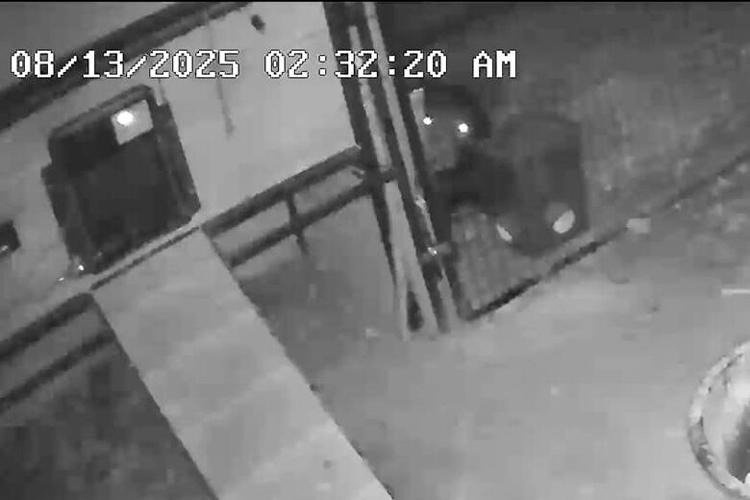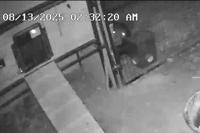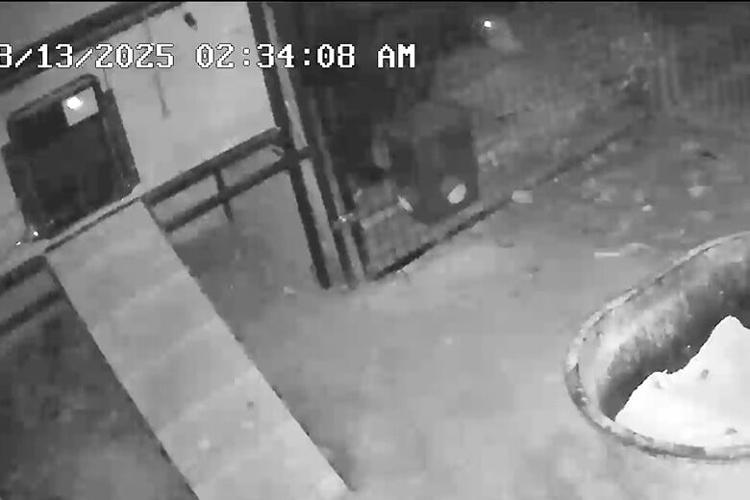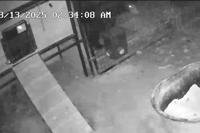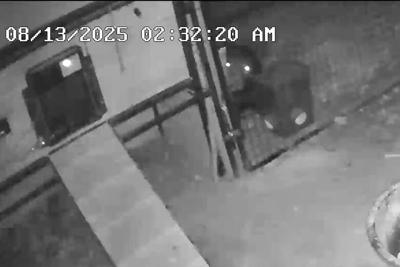The Missouri Department of Conservation received a report that a black bear was spotted on the north end of Scenic Drive in Festus early Wednesday, Aug. 13.
Josh and Sarah White of Festus reported the black bear to Festus Police and the Department of Conservation after spotting it on footage from a surveillance camera outside their home. Sarah checked the footage after Josh noticed damage near a chicken coop.
“We captured a bear on video outside our chicken coop tearing down some corner posts attached to our runs,” Josh said, adding that he and his wife named the bear “Brandon” in honor of a close friend who died in April.
He said Cpl. Patrice Pyatt, a wildlife biologist with the Missouri Department of Conservation, came to their home and helped secure the chickens with an electric fence.
“(Pyatt) gave us some different tools in case Brandon the bear returns,” Josh said. “All this she did in the scorching heat. We are thankful for her help.”

The Whites said they are thankful their four chickens were unharmed.
Jefferson County conservation agent Cpl. Lexis Wilson said Friday afternoon, Aug. 15, that the agency only received one report about the bear so far.
Those who see a bear in Jefferson County should call or text Wilson at 314-696-9425 or agent Ben Bardot at 314-954-5697 with the location of the bear and when it was seen. Or send an email to lexis.wilson@mdc.mo.gov or benjamin.bardot@mdc.mo.gov.
“As long as it’s just moving through and it’s not doing anything, there’s not any other action needed,” Wilson said. “I like to remind folks that if they’re just seeing it and it’s just a big wild animal outside not doing anything, that a bear outside is not a 911 call.
“I understand a large wildlife with big claws and teeth can sometimes startle somebody, but remember that it’s just like a big raccoon and we wouldn’t call 911 every time we see a raccoon in our yard as long as it’s not doing anything that makes someone feel threatened.”
Wilson said black bears are pretty docile and skittish by nature.
“If you are ever outside with a bear … like any other wildlife, don’t block it into a corner,” she said. “Make sure it has an escape route. And you can make yourself seem larger by putting your hands on your head, clapping your hands, calmy but loudly hollering, ‘Hey bear, hey bear,’ and it should turn and run.”
Wilson said black bears will stand on their hind legs to get a better vantage point to sniff the air.
“If you see a bear do that, that is not a sign of aggression. They’re just trying to get a better sense of what’s around them,” she said.
Wilson said do not turn and run from the bear because the bear may take that as a sign of a challenge and decide to chase.
She said the bear spotted on Scenic Drive was likely a young male.
“Male bears get kicked out of their mom’s den somewhere at 2 to 3 years old, and then they wander to find their own territory and their own mate,” she said. “They’re very opportunistic. They’re always found kind of moving through some of our rural subdivisions. I think of them as a giant raccoon. They’ll literally eat anything ¬– berries, seeds, meat, trash, dirty diapers, anything.”
Wilson said people typically see bears in the late spring or early summer. She said there have been a handful of reports of bears in Jefferson County this year, but those bears have just moved on.
“I haven’t received any more reports of him (this bear this week), so probably that means that he’s just a bear doing bear things and hopefully will kind of stay out of people’s way,” she said.
Wilson said she feels residents are getting used to the idea that there are bears wandering through the county. Bears in Missouri are more common south of I-44.
She said Jefferson County has some thick forested areas and rivers, and bears usually follow those river corridors looking for their new home.
Wilson said the biggest warning she has about bears is to not feed them.
“We have a rhyme here at the Department of Conservation ‘a fed bear is a dead bear,’” she said. “We don’t want bears associating people with meals. Because while black bears are a pretty docile species of bear in general, any wildlife, once it becomes dependent on people for food, can become more aggressive, can become more dangerous.”
Wilson said if you hear of a bear in your neighborhood, take down the bird feeders and bungee cord the trash cans or move them inside a garage or shed for a few days and stop feeding any pets or wild animals outside.
She also suggests putting electric fencing around beekeepers’ beehives and looking at ways to make chicken coops harder for a bear to get in.



